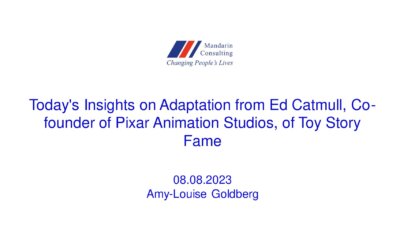08.08.2023 Today’s Insights on Adaptation from Ed Catmull, Co-founder of Pixar Animation Studios, of Toy Story Fame

Dear Students,
“There is no sweet spot.”
These are the words of Ed Catmull, co-founder of Pixar with Steve Jobs and Alvy Ray Smith in 1986, who attributes Pixar’s eventual success, after years of losing money, to the ability to adapt. By extension, organizations and rising talent who become too “comfortable” with how you do what you do, and/or with the extent of your current knowledge, are actually in a precarious spot, no matter how “sweet” your experience, because change is constant, as is the need to evolve along with it.
|
The animation pioneer says businesses must learn to adapt to a world where ‘nothing is stable.’
|
For those of us who recall, this concept brings to mind the infamous tale of Kodak and Fuji. Holding tightly to their comfort with and legacy of photographic film, Kodak refused to embrace the shift to digital photography, and eventually lost out to Fuji, who saw change on the horizon and found alternative uses for their photographic chemicals. As Catmull puts it, “… you can’t hold off what’s coming any more than Kodak can go back to selling film. You just need to try to step into it to see where it goes.”
As we all know, change, and evolution, are inevitable anyway, so why not embrace them? Why not approach novelty with curiosity, ambiguity with a sense of opportunity and confusion with optimism? There’s no question that an ambitious international student like you, who seeks to be a positive disruptor,
is going to get things wrong sometimes; this is part of the process, especially early on (per our articles from last week). But candidates with dreams, intelligence and education like yours cannot let such fears keep you from innovating, in the way that Kodak did. As this Wall Street Journal article points out, “Before 1995, Pixar had been hemorrhaging money.”They’d placed their bet on computer animation, to little avail, and then bang!, in a wonderful turn-around, Toy Story changed their fate and became a blockbuster, followed by 3 more in the series (and another on the way).
Catmull is the first to point out that this shift would not, in itself, be sufficient to extend Pixar’s good fortune. “I saw that my job at Pixar was actually to look at our process and find out why things worked or didn’t work,” he admitted. The rest was indeed history – or herstory – “[Catmull] was determined to build not just a winning company but a “sustainable creative culture” by encouraging communication and removing hierarchies. The management principles he laid out in his bestselling 2014 book “Creativity, Inc.,” co-written with Amy Wallace, helped make Pixar a seemingly irrepressible hit machine.”
Thus, the value of perseverance, and the need for flexibility (and yet consistency in implementation) among eager university talent like you, who are seeking a global internship or full-time position and career. Through coaching, aspiring professionals like you will come to understand that pursuing innovation almost ensures that there will be failures, mistakes, errors, mishaps, missed opportunities and second-guesses along the way. But that doesn’t mean that it’s not worth the journey. “Failure, Catmull maintains, “is a natural byproduct of innovation, and change is the only constant in every industry.”
Our coaches are here to help talented students like you to recognize that developing the commercial awareness skills to closely follow your current industry, along with the diligent attention to key broader trends, both economic and geo-political, will prepare you to take – and win at – “calculated risks.” Are such “chancy” steps worth it, when others are watching you and perhaps judging you? “By the time [Catmull] retired in 2018, Pixar’s films had won 15 Academy Awards and earned more than $13 billion at the box office.” In short, young professionals like you can draw the conclusion for yourself.
